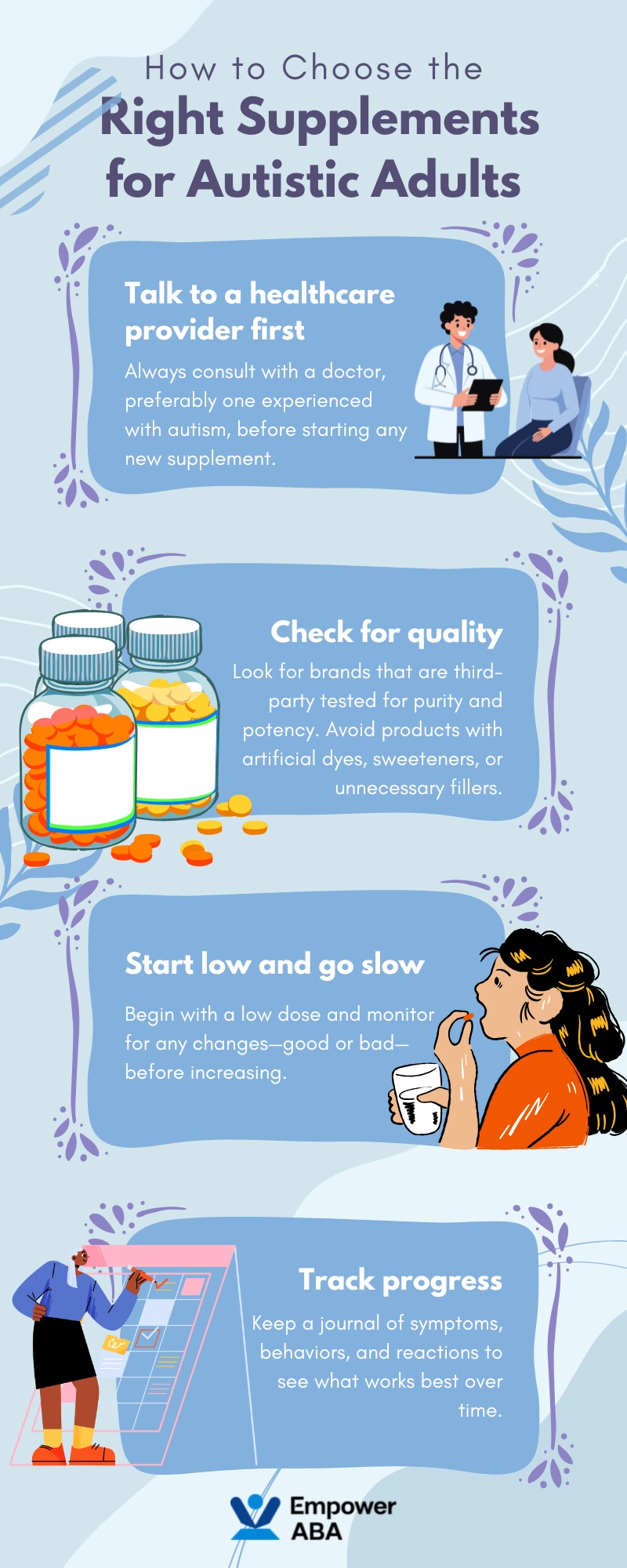Key Points:
- Supplements can help support the health and well-being of adults with autism when used appropriately.
- Key nutrients like omega-3s, magnesium, and certain vitamins may ease common challenges such as anxiety, mood swings, and digestive issues.
- Always talk to a healthcare provider before starting any supplement, especially when managing autism alongside other health needs.
Navigating adulthood with autism can present unique challenges, and many families look for safe, supportive ways to improve quality of life. While no supplement can “cure” autism—and none should ever replace medical or therapeutic care—some nutrients may help support overall well-being. When used thoughtfully, supplements for adults with autism can be a helpful part of a comprehensive care plan, especially when tailored to one’s nutritional needs.
Can Supplements Really Help Adults With Autism?
Yes, but they’re not a one-size-fits-all solution. Supplements can play a supportive role, especially when addressing nutrient deficiencies, calming anxiety, and improving gut health—all common concerns for adults on the spectrum. However, it’s important to understand that results vary, and supplements work best when combined with other therapies, like behavioral support, healthy routines, and medical guidance.
Understanding Nutritional Gaps in Autism
Adults with autism often have unique dietary habits, and that can lead to nutritional imbalances. Some individuals may be very selective eaters or have sensory issues that make certain textures or flavors off-putting. These challenges can lead to deficits in key vitamins and minerals that the body needs to function well.
In particular, studies have found that people on the autism spectrum may be more likely to be low in:
- Omega-3 fatty acids
- Magnesium
- Zinc
- Vitamin D
- Vitamin B6 and B12
- Folate
Let’s explore how these and other supplements can support different aspects of health.
3 Best Supplements for Emotional and Mental Well-Being
Many adults with autism experience heightened levels of anxiety, mood swings, or trouble regulating emotions. Certain supplements may help promote emotional balance in a gentle, natural way.
Omega-3 Fatty Acids
Omega-3s, found in fish oil, are one of the most researched supplements for autism. They support brain health and may help reduce inflammation in the body. Some studies have shown that omega-3s can improve mood, focus, and even reduce symptoms of anxiety in adults with autism.
Magnesium
Often called “nature’s chill pill,” magnesium plays a key role in calming the nervous system. It may help with sleep, reduce irritability, and lessen physical signs of stress. Magnesium glycinate and magnesium citrate are commonly recommended for their good absorption and mild digestive impact.
Vitamin B6 with Magnesium
This combo is sometimes used in autism treatment because it may support neurotransmitter activity, which affects mood, sleep, and behavior. Some individuals have found improvements in energy levels and focus when using this duo.
2 Supplements That Support Digestive Health
Many adults with autism deal with ongoing gastrointestinal issues, such as constipation, diarrhea, or bloating. Supporting gut health can make a surprising difference in mood, behavior, and comfort.
Probiotics
Probiotics introduce beneficial bacteria to the gut, helping balance digestion and possibly improving mood and immune function. Choose a reputable brand with multiple strains of bacteria, such as Lactobacillus and Bifidobacterium.
Digestive Enzymes
Digestive enzymes help break down food more effectively, which can be especially useful if certain foods trigger discomfort. They may reduce bloating and help with nutrient absorption.
3 Supplements That Support Brain Function and Focus
Cognitive support is another reason many turn to supplements for adults with autism—especially in older age. Focus, attention, and memory can sometimes improve with certain brain-supportive nutrients.
Zinc
Zinc is important for brain signaling and immune function. Low levels have been linked to difficulties in communication and social interaction. A healthcare provider can check zinc levels through a blood test to see if supplementation is appropriate.
L-Carnitine
This amino acid-like nutrient supports energy production in cells. Some research suggests that L-carnitine may help improve focus and reduce repetitive behaviors in individuals with autism, though more studies are needed.
N-Acetylcysteine (NAC)
NAC helps the body produce glutathione, a powerful antioxidant. It may also help reduce irritability and repetitive behaviors. NAC should only be taken under supervision, as it may interact with other medications.
How to Choose the Right Supplements for Autistic Adults
Not all supplements are created equal, and finding the right fit requires a bit of thought and professional support. Here are some practical tips to help guide the decision:

Supplements are a Tool, Not a Cure
It’s important to remember that while supplements for adults with autism can offer meaningful support, they are not a cure and should never replace behavioral therapies or medical treatment. They work best as part of a broader care approach that includes a consistent routine, therapeutic support, and strong communication among caregivers, doctors, and the adult themselves. This holistic understanding of autism also extends to how sensory issues can influence well-being—one example being food-related challenges, as explored in Exploring the Link Between Autism and Taste Sensitivity.
When to Consider ABA Therapy
If supplements are helping but daily challenges remain, it might be time to look at behavioral support options like Applied Behavior Analysis (ABA) therapy. ABA is a well-respected, evidence-based therapy that helps adults with autism build life skills, improve communication, and manage behaviors in real-world settings.
Looking for personalized support beyond supplements? Empower ABA offers compassionate, expert-driven ABA therapy in New York and Virginia. Whether your loved one needs help with daily routines, social skills, or reducing challenging behaviors, Empower ABA’s team is ready to help you build a path forward.
Get in touch with us today to learn more about how their team can support your family’s journey with autism. Because no one has to go it alone—and with the right tools, brighter days are ahead.

